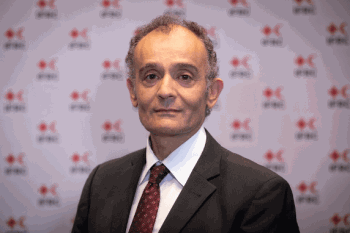International panel describes challenges COVID-19 poses to international humanitarian law
Helen Metella - 23 October 2020

The COVID-19 pandemic is making it more dangerous and complicated to deliver medical assistance in areas of armed conflict and to fulfil the rules of international humanitarian law, said participants at a conference presented through the University of Alberta Faculty of Law and the Canadian Red Cross.
The problems exist on several planes, said panellists at the 2020 International Humanitarian Law Conference, held virtually on October 22 and co-organized with the Faculty’s Law Students for Human Rights club. Compounded, these issues are making it difficult to adhere to the rules of international humanitarian law, which state, among other directives, that the parties to a conflict must ensure that medical workers and hospitals are not attacked and that civilian life is not excessively damaged.
Challenges the pandemic has created in conflict zones range from interrupted supply chains that delay shipments of medical supplies and personal protective equipment, to irrational fears that are prompting violence and stigmatization of both patients and the medical personnel trying to assist them.
“Between February and September, we recorded more than 600 violent incidents against patients and health-care providers, related to COVID-19,” said Alex Breitegger, thematic legal advisor to the International Committee of the Red Cross.
“Many of these manifestations came from patients or relatives of patients not content with the services offered in terms of health-care facilities,” he said. “Health-care facilities are also under attack for fear of (them) spreading the virus.”
Sanctions Add Difficulty
In North Africa and the Middle East, COVID-19 has produced many similar issues and is exacerbating others, said Hossam Elsharkawi, regional director of the International Federation of Red Cross and Red Crescent Societies.
International sanctions imposed on many countries have “amplified the level of suffering and the inability of those countries to respond,” and loss of daily income has rendered directives to “stay home and wash your hands” meaningless.
“No mother or father will be at home isolating if their kids are hungry,” he said.
In Mali, Dr. Mamie Kiluka, with Médecins Sans Frontières, has long battled culturally rooted gender discrimination that prevents women from being brought into clinics in a timely fashion but now faces COVID-19-related disinformation, too. For instance, some people believe anyone wearing a mask is intent on harming, not helping them.
The 90-minute panel discussion, which featured speakers joining from as far away as France, Lebanon and Mali attracted 135 people from around the world It was moderated by Professor Joanna Harrington, an authority on the interplay between obligations of national and international law at the Faculty. Emily Bielech, ‘21 JD, vice-president of the student club, gave the land acknowledgement.
Prior to the panel discussion, the organizers also convened a short lecture that provided a brisk but information-laded overview of what international humanitarian law is, hosted by Catherine Gribbin, a senior legal advisor in international humanitarian law at the Canadian Red Cross.
Links to each event will be available in the coming days at the Red Cross website.